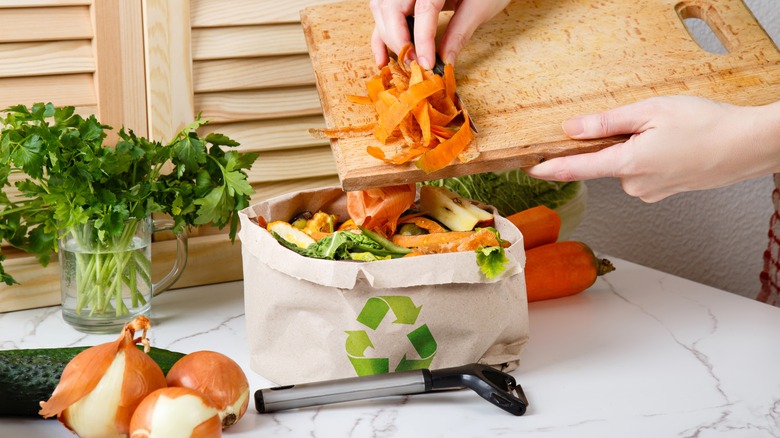Easy Ways To Reduce Food Waste In The Kitchen, According To Priyanka Naik - Exclusive
Food waste in America is a big problem. The USDA estimates up to 40% of our food supply goes uneaten. Priyanka Naik is on a mission to change that. As a vegan chef living in New York City, Naik is well aware of the challenges people face regarding reducing waste. In an exclusive interview, Naik told us the easiest ways to reduce food waste and why she feels so passionately about it.
Naik's first suggestion is to reuse leftovers. She empathizes with people who do not like eating the same meal repeatedly, but as she points out, throwing away leftovers is "money down the drain." Instead, Naik suggests using leftovers as a base for another meal. Options include turning leftover rice into fried rice or turning leftover veggies into a hearty salad.
Second, Naik suggests composting. The vegan chef always cooks with some kind of vegetable and racks up plenty of scraps. Since Naik lives in an apartment with no way to compost on-site, she gets creative. Rather than throw them away, Naik says she freezes her scraps and takes them to community composting sites, such as the farmers' market.
Using kitchen scraps
However, Naik takes things a step further and ultimately tries to avoid the composter altogether. She points out that many items often discarded can be eaten. Naik references cauliflower leaves and carrot tops as prime examples of food with added value. Cauliflower leaves can be blanched and blended into a sauce. Carrot tops can be used similarly to other green herbs to add flavor and interest to a dish. Naik dries them and eats them like a kale chip.
Naik even suggests saving peels. Fruit peels, such as pomegranate and banana peels, can be used in smoothies. Onion and ginger peels can be saved and dehydrated, then turned into onion and ginger powder — the same kind you would otherwise purchase from a store.
Naik reiterates that while environmental issues are a driving force, most people see another benefit. "If you don't care about the environment, you do care about your wallet." In the past few years, grocery prices have skyrocketed, with the USDA noting an estimate from the Bureau of Labor Statistics, which suggested they're 25% more than they were in 2019. Reducing waste is one way to balance out this inflation and help support your bottom line.

